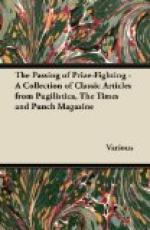It is DAUBINET. He advances from somewhere, from an opening, the existence of which I had never suspected.
“Here! This way! Par ici, mon ami; par ici!”
And in another minute I am with him—I am out—and so is the candle-end. Ah! I breathe again!
“The first time, I believe, that you have ever seen these caves,” observes M. VESQUIER, quietly, “which, one way and another, represent several miles of walking.” Then looking at his watch, he adds, “It is time for breakfast. You must be hungry.”
I am. Hungry, but oh! so grateful! If it weren’t so expensive, I should give a Champagne-window to the Reims Cathedral, in piam memoriam of my fortunate escape. A real pane (not coloured paper pretence) in a window would be an appropriate memorial. Or, at all events, I might give one small “light,” which, as recalling that little guttering, sputtering, candle, would be still more appropriate.
* * * * *
OUR BOOKING-OFFICE.
The Baron’s Assistant Reader reports again:—I have just read The Book-bills of Narcissus, An Account rendered by RICHARD LE GALLIENNE. (FRANZ MURRAY; Derby. Leicester and Nottingham.) It doesn’t make any difference to me whether this dainty little book was actually published at Derby or at Leicester or even at Nottingham, noted of old for lambs. It makes right pleasant reading, and that is the chief point. The Narcissus, about whose life (except in the matter of book-bills, by the way) we here learn a good deal, must have been an agreeable companion—for those who allowed the lad to have his own way, and always kept a spare L10 note handy for the humouring of his little caprices. His wayward moods, his innocent love affairs, his wanderings, his reading, his culminating grand passion, Mr. LE GALLIENNE renders his account of them all, and does it in a fresh and breezy style which suits his pleasant subject admirably. There is a special charm too about the graceful lyrics which sparkle here and there in the pretty little volume. In fact Mr. LE GALLIENNE is an artist. I don’t say a genuine artist, because he justly dislikes the qualification.
[Illustration]
OSCAR WILDE has desisted for a space from mere paradox, and gives us (am I late in thus noticing it?) Lord Arthur Savile’s Crime. and other Stories. (London, J.R. OSGOOD, MCILWAINE & Co.) Macte virtute, say I; the tag is old, but ’twill serve. If you want to laugh heartily, read Lord Arthur Savile’s Crime, the story of a deeply conscientious man to whom murder very properly presents itself as a duty. Then, if you wish to laugh even more violently, read The Canterville Ghost, in which OSCAR goes two or three better than Mr. W.S. GILBERT. I am specially thankful to OSCAR. When he is on humour bent, he doesn’t dig me in the ribs and ask me to notice what a wonderfully funny dog he is going to be. He lets his fun take care of itself, a permission which it uses with great discretion. Please, OSCAR, give us some more of the same sort, and pray introduce me once more later on to the Duchess of Cheshire. If she continues to be as delightful as she was in her sweet girlhood, I envy his Grace.




